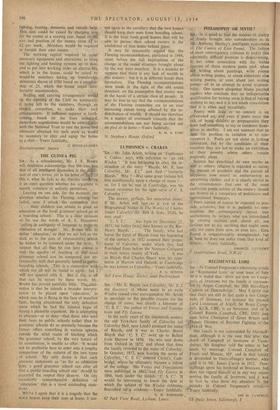THE GUINEA PIG ... SIR, --As a schoolmaster, Mr. J.
E. Brown will doubtless acknowledge that the sinequa et ion of all intelligent discussion is the d^ i- tion of one's terms; yet in his letter ofTmi 23 this is what he fails to do, thereby renaeng it an open question whether his argument is merely valueless or actively pernicious. Leaving on one side, for the moment, the question whether the Fleming, scheme. has failed, may I attack • the contention that • . . . their children can obtain as good un education at the local grammar school as at a boarding school.' This is a clear instrthee of (to use the words of A. E. Housman) ' calling in ambiguity of language to pro-tote confusion of thought.' Mr. Brown fails to define ' education,' so that we are left in the dark as to the area of responsibility #which he wishes to he assumed under the term. 1 suspect that all that he can here intend is that the quality of teaching at the local grammar school can be compared not un- favourably with that generally found at public hoarding schOols. This is a contention with which not all will he found to agree: but I will not quarrel with it. But if this is all that can be meant by these words, Mr. Brown has proved painfully little. Theo.alter- native is that he intends a broader interpre- tation to he placed upon 'education,' in which case he is flying in the face of manifest facts, having abandoned the only definition upon which he had the faintest hope of basing a plausible argument. He is attempting to obscure—or to deny—that those who send their boys to public schools rather than to grammar schools do so precisely became the former offers something in various spheres outside the strict realm of teaching which the grammar school, by the very nature of its constitution, is unable to offer. It would : not be profitable here to enter into a lengthy comparison of the natures of the two types
. of school. My only desire is that such speciouS statements as ' as far as education t
goes, a good grammar school can offer, all that a public boarding school can' should be accorded the respect they deserve. On any reasonably comprehensive definition of ' education ' this is a most misleading state- ment.
not agree in the corollary that the best homes should keep their sons from boarding school. It is the boys from good homes that will be able to pursue their school careers in the confidence of that home behind them.
It may be reasonably argued that the Fleming recommendations, published in 1944, came before the full implications of the change in the social structure brought about by the war were manifest. It is a mistake to suppose that there is any lack of wealth in this country: but it is in different hands than heretofore. The Fleming recommendations were made in the light of the old social structure, on the assumption that money was in the hands of a certain class of people. It may be true to say that the recommendations of the Fleming committee are to an ever increasing extent being affected by the re- distribution of wealth. It should not therefore he a matter of overmuch concern that the recommendations are not being carried out au pied de la lettre.—Yours faithfully,


































 Previous page
Previous page